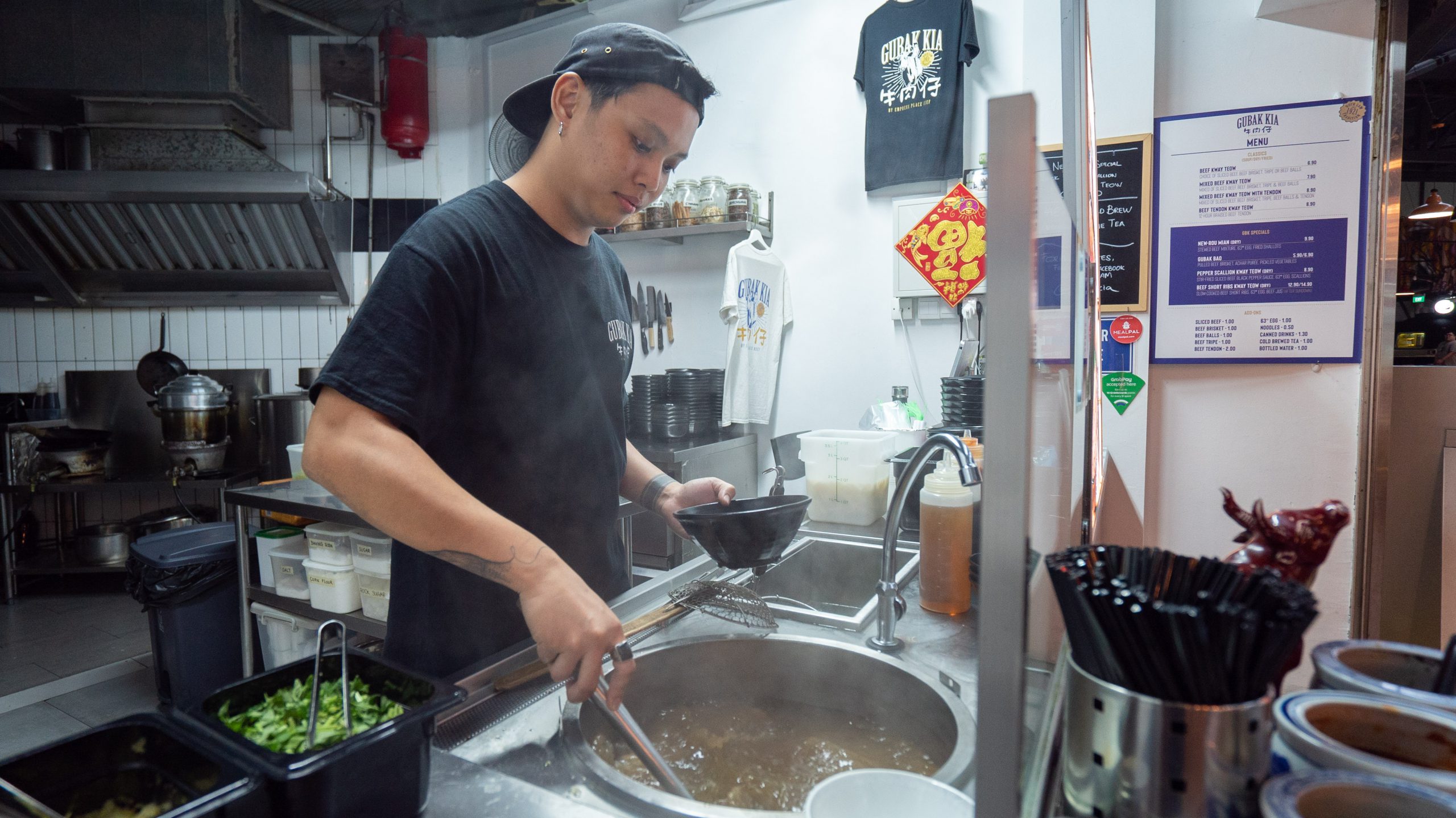Growing up, John Paul’s family was unlike most of ours. Their family dinners were at the coffee shop tables where his dad peddled their famous beef noodles, and John pretty much grew up there.
“I was that small boy at Siglap who carried like three, four bowls of hot soup all at once.”
At 11 years old, John was already known by regulars as “Gubak Kia” (Hokkien for “beef boy”), an endearing nickname for the son of ‘Gubak’, which is what they called John’s dad.
It was a name that John hated, but grew to embrace as he continued helping out at his father’s stall. In fact, this name now brands the hawker stall John runs at Timbre+, where he sells the same traditional bowls of Empress Place Teochew Beef Kway Teow along with his modern creations.
The Cooking Life Chose Him
Now 25, John is a full-time hawker. But this was not exactly his plan at the start.
As someone who always wanted to be out-and-about, John had lofty dreams of making a living off travel photography and writing. This led him to pursue a Mass Communication course in Kaplan.
However, the more he helped at his dad’s stall, the more he felt pulled into the trade. He began observing the way his dad prepared orders, noting details like how long his dad would cook the kuay teow for or how to portion the meat.
His first attempts at cooking came about when his dad left him alone at the stall.
“I started making my own bowls of noodles when my dad went on breaks. Then, my dad would tell me what I did right or wrong when he came back.”
With time and practice, John developed a better understanding of cooking, and this sparked his deeper interest in the culinary world.
Scouted By The Boss Of A Gourmet Burger Joint
John’s ‘big break’ came when the boss of Wolf Burgers saw his resume on a job portal. In disbelief that a 19-year-old kid could have nine years of hawker experience, he paid a visit to the stall covertly.
“He came with his wife, ordered a bowl, sat outside and watched me,” John recalled.
That day, John was offered a job in the Wolf Burgers kitchen. It was a golden opportunity, but John hesitated.
“I was really scared that I would mess up, because I had never worked in a professional kitchen or had any proper training,”
He gave it a shot in the end, and it was also through this stint that John realised his true passion in cooking. He went on to work at Camp Kilo and Kilo Lounge, where he was trained in more diverse types of cooking and cuisines.
Then, his dad got into an incident.
“I saw how bad my dad’s hand injury was. I also saw that he was getting older, and I knew I had to do something.”
Retaining And Recreating Traditions
Coming full circle, John brought years of culinary expertise in different kitchens and cuisines back to the beef noodle stall.
He started experimenting with the various ingredients he could find around the stall during lull periods.
As luck would have it, he met an old friend, Lincoln, who saw the potential in the beef noodles and John’s desire to build the brand. The duo drew up business plans and sought investors, but “who in the world would entrust such a big amount of money to two 24-year-olds to run a shop?”
Instead of giving up, the pair took the leap themselves. Lincoln forked out the capital and with some help from John’s former boss, their stall Gubak Kia came to fruition in May 2019.
In a way, Gubak Kia is John’s homage to his family legacy, which traces back to his great-grandfather’s time at Hock Lam street in 1921. Despite this history, John’s dad never asked for John or his siblings to take over. But for John, he naturally saw it as his duty to preserve their name.
“If it stops at my dad, I don’t know if I can live with that.”
“I love the food,” he explained, “and if I don’t cook it, I won’t get to eat it ever again.”
Carving His Path As A 4th-Gen Hawker
Starting Gubak Kia is also John’s way of showing appreciation to his dad.
“My dad toiled so hard to build this name up, and I don’t want to see it go to waste.”
While John retains most of the foundations of his dad’s dishes, he also creates modern twists to these traditional dishes, like introducing Beef Short Ribs to their classic bowls of Beef Kway Teow, and Gubak Bao.
No doubt, being a young hawker has its challenges. Whether it’s the worry of an inconsistent cash flow or the physical strain of working in a hawker kitchen, these are all part of pursuing a business venture or an unconventional career. But for John, the food always comes first.
“I don't really care about the money part as much, I just hope that we can make rent. The only important thing is that people are happy with the food, and they know about my father, about Empress Place.”
“It’s tiring but fun,” John mused. After all, the kitchen is where he comes alive. The best part of it all is that he toils, knowing that people will get to eat what he loves.
Reflecting on his journey, John talked about many fears he had, but his persistence and determination paid off.
“If you know you’re working towards something and you are humble about it, there will always be a way to make it work.”
-
Always Had A Passion You Wanted To Pursue?
Like Gubak Kia and many others, we all have dreams we wished we were brave enough to pursue.
Check out a series of workshops done in collaboration with Spark The Next here for more inspirational passion stories, and how you can chart your own path to success!
(This article was written in collaboration with Spark The Next by the Ministry of Culture, Community & Youth.)
If there’s one question I dread the most in a job interview, it’s “Where do you see yourself in five years?”
I don’t even know what I want for lunch, let alone the next five years of my life. Sure, I’ve been taught model answers to impress employers, but that doesn’t take away the fact that it’s honestly a freaking scary commitment to make.
Recently, a Redditor posed this question to Singaporeans:
“Corporate slaves, how do you stop dreading going to work every day?”
To which the top reply began with “Welcome to work life bro.”
Indeed. Welcome to work life.
As a (relatively) young Singaporean who has come to realise the importance of money in modern day life, this is highly relatable. When I first graduated into the working world, I was on hindsight, naively idealistic. “Money isn’t everything,” I used to proudly proclaim. “I’d rather earn little doing what I like than be paid well doing something I hate.”
However the truth is, the moment you start becoming financially independent is the moment you realise that money is important.
Yet, the scariest part of this ‘welcome to the work life’ notion is how everyone of us relate to it. It is scary because there’s this sense of aimlessness and purposeless that is so pervasive in our society.
This concept of us having to work till we die just to survive in Singapore isn’t new.
All my life, I’ve heard people sigh over not knowing what they truly want in life (myself included). A lot of us end up just cruising through, hoping that someday, somehow, we will find a deeper purpose. And until we do, we will continue to put up with jobs that we convince ourselves to stay in, and we will continue to despair over having to spend nine hours a day, five days a week for the rest of our lives, selling our soul to work just to earn money to live.
We’re But A Nation Of Corporate Zombies
It’s a problem of the privileged. For our previous generations and the poor, the need for survival far outweighs the luxury of achieving ideals in one’s career.
However, having grown up in an entirely different world where survival isn’t a concern, the many opportunities we have been given have inadvertently spoilt us. Where there isn’t that pressure of survival, what we face is a deep longing to chase something that fulfils us. And for many of us, we either don’t know what fulfils us, or we are too afraid to chase it.
Image Credit: YourTango
Perhaps it’s our upbringing. We're all moulded according to a default educational structure set out for the masses. Grades were everything and scoring well in school pretty much determines one’s journey ahead—score well and be rewarded a smooth-sailing journey ahead, else, be prepared to work extra hard in the future just to reach a level playing field.
And when there's no more academic excellence to pursue, it is very easy for one to feel lost. We have never been taught to pursue excellence in non-academic interests, or rather, it is always not a priority compared to scoring well in our English, Math, and Sciences.
Having worked with batches of interns across the various jobs I’ve done, I can confidently say that a lot of JC, polytechnic, and university graduates don’t really know what they want to do or where to go after they graduate.
“Maybe I’ll travel first lor, see how.”
“Not sure leh, see what opportunities there are out there first.”
Everyone is just lost. There’s no clear direction in life. When we have reached that point of our life, no one’s there to tell us what to study or what to do anymore. And that can be very scary for a fresh graduate, because we want to prove our worth. Even our first job has to be ideal, because we know how important a first job is and how it is going to affect our resume and portfolio.
Many youths I’ve spoken to who has taken a gap year shared how they’ve had to convince their parents, because taking one year to ‘find yourself’ is a waste of time in their parents’ eyes. However, it is often this one year of exposure and experience in the ‘real world’ that matures us. For some, it is what helps them find purpose, or at least, it is what shows them what they absolutely do not want to do. But I believe there is also a large number of people who teeter on, just getting a job for sustenance and wishing for change to happen.
Nothing’s Going To Happen, Bro.
However, purpose is also a choice. And a lot of us end up never finding our purpose because we are too afraid to pursue what we want.
Most of the time, it is not that we don’t know what we want in life, but we are too afraid to acknowledge those dreams we have. Pursuing dreams is hard work and as with anything, a risk.
It could be that we are worried about finances—what if we lose money? It could be the self-doubt and fear that we aren’t good enough to ‘make it’ in Singapore’s ultra competitive landscape. Along with that, there’s the fear that we will be wasting time if our efforts go to nothing. Even with advice like ‘don’t be afraid to fail’, the possibility of failure and ‘losing face’ from failing is terrifying, and it deters a lot of us from dipping our toes into new territories.
We end up creating excuses to convince others and ourselves to stay within our comfort zone. At the end of the day, we just follow through the motions, waiting for something to happen. This will cause anyone to get jaded very easily and very quickly.
The only way to find purpose and be happy with our life is to figure out what we truly want and more importantly, to work for it. And it’s encouraging to see more and more Singaporeans quitting their corporate lives in their late twenties to thirties to pursue what they’ve always wanted to do: in starting their own fashion label, running their own hawker stall, and many more.
There’s no way to achieve perfection in all aspects of life because life is just that short. It really goes down to knowing what we want to prioritise.
It doesn’t matter if we are driven by money or if it’s a desire to do social work, because as long as we know what to work for, half the battle is won. Because only then will we be able to figure out what we can do in our everyday lives to fulfil ourselves. And nothing ever comes easy, so either we get busy living, or get busy complaining.
Also read: A Letter To The Singapore Government, From A Young Singaporean.
(Header Image Credit: <a href="
A Rigid Definition Of Success
According to the Oxford dictionary, a talent is someone who possesses “natural aptitude or skill”. Naturally, we measure someone’s aptitude or skill by how well they do what they do, or how successful they do it. We associate talent with success because the ability to cook a bowl of Maggie curry wouldn’t instantly make one a Michelin-starred chef. However, the stiff mindset of only recognising talents when they are successful enough creates a whole host of other problems. While it is a fair consideration that helps separate the casual hobbyist and the dedicated ones with a higher calibre, it is also an obstacle that prevents those with potential to fully unleash their capabilities. The Ben Davis case was a good example. There are many points to debate about, but that is not what I’m driving. Instead, his case shows the very rigidity of the way we recognise talents. Or rather, how our governing bodies deem as ‘worthy enough a talent’, because apparently, a sportsman has to “represent Singapore in international competitions like the Olympic Games and are potential medal winners for Singapore” to be granted deferment for NS.
Are We Too Pragmatic For Our Own Good?
This insular sense of success and talent also stems from a very practical part of us: The need to earn a living. The first thing that comes to our minds when we think of success is someone who is rich or holds a high-paying career, who owns a car, lives in a nice house, and basically has most of the 5Cs. Our competitive society and the value of pragmatism have been so ingrained in us that it makes us fear failure. Instead of exploring possible ‘what ifs’ in a path less taken, most Singaporeans would opt for the safer route. Furthermore, there are no free meals and one still need a proper income to survive in Singapore.


